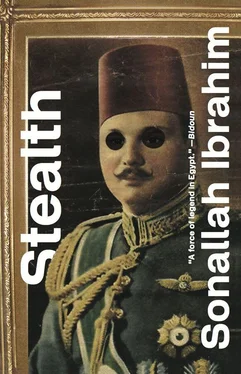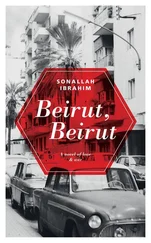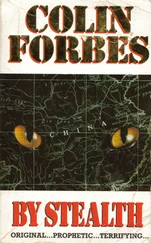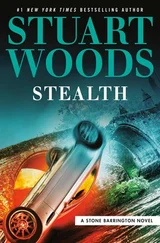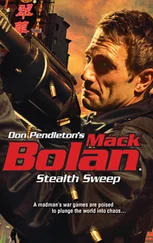Mama Tahiya claps: “What shall we make you do?” She adds: “Cover your eyes.” My father teaches mother to play poker. He laughs when he wins. She puts the cards on the table and says: “This game is forbidden by God.” He says: “Go on, old lady. We’re playing for small change.” She’s stubborn: “No! It’s forbidden.”
He lies on his back. She pulls out a sash and kneels on top of it. He stretches his hand toward her chest, but she gets away. She wraps the sash around his eyes and ties it over his ear. She waves to me to come closer, then whispers: “Spit in his mouth.” She tells him to open his mouth. He does it. I lean over him. I spit.
He shivers, sits up, and screams: “You dog! You son of a bitch!” He unties the sash and throws it across the room. Mama Tahiya and I jump up off the bed. She opens the door and pushes me into the hall, then shuts the door behind me. I run to our room. Crashing and banging sounds come from their room. A moment of silence passes. Mama Tahiya’s voice rises up: “Ayyy!” I push on our door and go in. Father stands in the doorway to the balcony. I call to him: “Papa, hurry. Uncle is beating Mama Tahiya.”
He turns around and comes to me. We go out of the room and head towards the other one without talking. Sounds of “Ays” come one after another. Father listens in a trance. He pulls me by the hand to go back to our room. He closes the door behind us. He smiles and says: “Those aren’t the sounds of a beating.”
He prepares sakhina with warm milk for our evening meal. He boils some fenugreek. Adds molasses. The bread is cut into croutons. He throws it in a pan. Simmers it over a fire. He adds the fenugreek and molasses. Stirs it several times. He dishes it on to my plate and pours warm milk over it. I eat with a spoon while sitting on the edge of the bed. He raises the seat until it is level with the table top. Mother covers my chest with a bib that she ties behind my neck. She puts a bowl of soup in front of me. She gives me my tiny spoon. They sit on either side of me.
He turns off the light then comes back. He tells me to prepare my satchel and get ready for bed. He goes with me to the toilet. The door to the constable’s room is open a crack. The sounds of the radio broken up by static come from behind it. Um Zakiya’s radio is turned up. “Oh warriors in God’s tour. This is the day you’ve longed for.” I repeat the rest along with the radio: “We’re the creators of the art of war.”
Mama Tahiya moves across the living room. She is wearing a sleeveless, yellow silk dress. She is carrying a white handbag. A folded sweater rests on her arm. “Kareem” comes after her wearing a white shirt and grey trousers. A small hand towel in the palm of his hand flashes out from under his left sleeve like a flower. The two of them say “hi” to father. They leave the apartment. I settle into bed. Father sits in his full suit at my desk. He’s wearing his glasses and holding a book in his hand. Sleep starts to overtake me. I can sense that he wants to go out. I decide not to doze off until he takes off his clothes.
The voice of Hajj Abdel ’Alim comes up from the alley: “Khalil Bey! Khalil Bey!” Father opens the glass door to the balcony and tells him to come up. He opens the door for him. Offers him the desk chair. He himself sits on the edge of the bed. As always, the sheikh of the quarter starts clearing his throat. He says that Abbas has married and brought his wife from his home village. She is a nice, innocent girl. She might be able to clean up for us and do the cooking. Father says: “That would be great.”
Abdel ’Alim asks: “Have you been outside today? The streets are full of protests and people chanting: ‘Where’s our food, clothes, and basic things, thou most womanizing of all kings?’ ”
Father says: “They’re really raising the stakes.”
“The papers are calling them, ‘our first fighters.’ Refaat Effendi was in Port Said yesterday and he says that it’s full of Palestinians running from the Zionist forces.”
“How is Maged Effendi?”
Abdel ’Alim says that Zeraksh became pregnant and took him away to the kingdom of genies, so she could give birth there. She had the child without help from anyone and he walked the moment he came out of her.
Father asks with interest: “What did he see there?”
“They don’t have either streetcars or buses up there. There’s neither birds, nor animals, nor insects, nor cemeteries. Their digestive systems are like car engines. When they shit — excuse the expression — it comes out as steam flowing from their backsides exactly like car exhaust.”
“So why did he come back? He’d be right to just stay there.”
“He was choking from the lack of oxygen, so he told her he wanted to come back. She had him stand on top of her feet and put his hands on top of her head. She puffed out her cheeks and he suddenly found himself back in his own bed.”
“Just like that? And nothing happened to him?”
“He just has a slight headache all the time and stumbles every now and then when he’s walking.”
Father asks about Abdel ’Alim’s children. He answers: “The girl had a fever last night. I telephoned a doctor. He sat there and asked about my work and where we lived and then demanded three pounds for a house call.”
“Good God! What did you do?”
“The Lord provided. I gave her two aspirin and made her a cold compress. By morning she was better.”
He says he has come to visit father to ask a favor.
“At your service, inshallah.”
He says that Hajj Mishaal had trumped up a drugs charge against him and he needs father to testify for him in the case.
Father says right away: “I’m happy to help. What happened exactly?”
“He took the shop across from mine and wants to buy mine also, but I didn’t want to sell.”
He stands up saying: “I have to go by the shop now. Did you notice the loudspeaker that Mishaal has hung up?”
“Yeah. It reaches all the way to here. It doesn’t let me sleep.”
“Are you going to sit with us tonight? Um Kalthoum is singing The New Moon Has Risen.” Father turns toward me then says: “I’ll have to see.”
’Abdel Alim goes out. I sit up and say to him: “Papa, don’t leave me alone.” He studies me for a second then says: “Okay, get up and put your clothes on.”
I get dressed in a hurry. I wipe off the lenses of my glasses with a handkerchief. We go out into the alley. Siham looks out of her window as usual. We go out to the main street and head toward Sikakny Square. After crossing several more wide streets, we make it to Cinema Rialto. The crowded foyer. A whistle, noises and shouting. We climb up a short staircase to a raised viewing stand at the back. We sit on a wooden bench. The man selling pumpkin seeds, peanuts, and pretzels goes from bench to bench. I want to sit on her lap but she pushes me away from her. My father takes me between his knees. A seller passes by in a clean gallabiya with a basket covered by a cloth. He buys a giant pretzel with sesame for each of us. The vendor gives us each a bite-sized slice of Egyptian Romano wrapped in a paper.
Father buys me a tube of roasted seeds. A double feature. First there’s a short feature. It’s an episode of the adventures of Jesse James. The main feature is Bulbul Effendi, starring the singers Farid Al-Atrash and Sabah.
The screen goes dark suddenly and the lights come up. Shouts go up. Father takes off his fez and his bald head shines in the light. He lights a cigarette. Cinema Hillal in Sayida Zainab Square. I am with ’Azmy, the son of the maid of Mama Basima. We stand at the ticket window. The ticket seller wears a complete, fancy suit with a tilted fez. We don’t have enough for the tickets. He waves at us to sneak in through the third-class door. We stop close to the screen. It is filled with the face of Laila Murad.
Читать дальше
